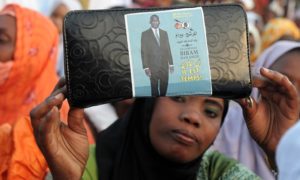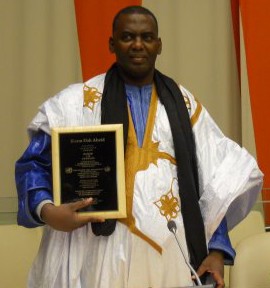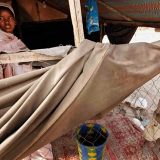Mauritania accused of ‘parody of justice’ as jailing of anti-slavery activists upheld (The Gardian)
Former presidential candidate Biram Ould Abeid vows to continue slavery fight from his cell after Mauritanian court ratifies sentence against trio of activists

A Mauritanian court has upheld a two-year prison sentence against three anti-slavery activists who were arrested during a protest against bondage in the west African nation.
Biram Ould Abeid, runner-up in the 2014 presidential elections and head of the Initiative for the Resurgence of the Abolitionist Movement (IRA), was jailed in January alongside two other activists.
In an open letter published after the ruling, he vowed to continue his fight against slavery and appealed for the US and EU to put pressure on Mauritania to act against the practice, including stopping financial aid.
“From my dark cell I urge them to mobilise all legal and diplomatic means, including the suspension of all financial aid, to push the government to take real action to eradicate slavery as well as the racism and exclusion underlying it,” wrote Ould Abeid.
The three activists were arrested in November 2014 while protesting against slavery and were found guilty of “belonging to an illegal organisation, leading an unauthorised rally, and violence against the police”.
The two others convicted were Brahim Bilal Ramdane, an assistant to Ould Abeid, and Djiby Sow, a civic and cultural rights campaigner.
Sow has since been released on parole due to health problems.
“This is a step backwards for freedom in our country, an example of judicial authorities’ submissiveness to executive orders,” said defence lawyer Brahim Ould Ebetty, who boycotted the hearing along with his clients.
He slammed a “parody of justice” just two weeks after Mauritania adopted a hardened law to crack down on slavery, which activists say is widespread in the country despite being criminalised in 2007.
The new law declared slavery a “crime against humanity”, criminalised various forms of slavery including forced marriage, and doubled maximum prison terms to 20 years.
“The intensification of the crackdown on anti-slavery activists in Mauritania has no legal justification in a country which, ironically, just this month adopted a law indicating slavery is a crime against humanity,” said Alioune Tine, west Africa director for Amnesty International.
Slavery is deeply entrenched in Mauritania, with slave status often passed on from generation to generation, according to the Australia-based Walk Free Movement, which estimated in its 2014 global slavery index that there were 156,000 slaves in Mauritania – about 4% of the population.
There are no figures available from the Mauritanian authorities. President Mohamed Ould Abdel Aziz said earlier this year that slavery no longer exists in the country, only what he calls “the last vestiges” of an old practice.
The country was the last in the world to abolish slavery, in 1981. Since 2007, slavery has been officially designated a crime. However, activists have accused the government of failing to implement the laws.
According to Sarah Mathewson of Anti-Slavery International, only one person has been convicted under the old law, while many cases have been watered down to “unpaid labour”.
Mauritanian authorities have accused the IRA of spreading “racist propaganda”.
In his letter, Ould Abeid explained how he devoted his life to fighting slavery after his father married a slave and saw his family torn apart by the practice.
“Today I write to you from the depths of a prison into which I have been thrown for calling for an end to this cruel practice,” he wrote.
He said that despite his efforts, the government had refused to recognise the IRA, which he created in 2008; instead, its members had been “harassed, tortured … and imprisoned” for belonging to an illegal organisation.
Ould Abeid said stronger action was needed from Mauritania’s foreign partners to end slavery in the country: “I refuse to throw in the towel. I refuse to be silenced. I refuse to abandon … those whose lives have been ruined by slavery.”


